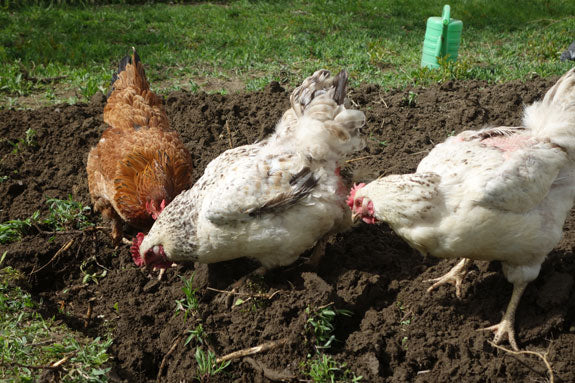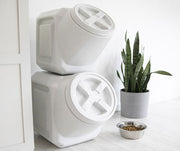7 Tips Every Backyard Chicken Owner Should Know

Introduction
Backyard chickens are becoming more and more popular. As people across America are returning to traditional values, chickens are becoming more and more of a staple. Chickens are also becoming popular as pets and companion animals.
This being said, keeping chickens can be a tricky job when you first start out. The sheer amount of information can be overwhelming, and it can be tricky for a first-time owner to know what to do.
Luckily, with a little digging, there are many tips and tricks you can uncover to help make keeping chickens easier. Here are our favorite tips for making chicken keeping easier.
1. Spend time with your chickens
The best way to get to know your chickens and understand how they are feeling is to spend time with them each day. Spending five minutes every day observing your chickens can be one of the best ways to spot if one of them is unwell or if you have a problem in your social group.
Healthy chickens will be busy exploring the coop or garden, chasing insects, or socializing with the other hens. If you consistently notice that one hen is not spending time with the other hens, you may wish to take her on visit to the vet.
You may also wish to do a once a week once over by picking up each hen and examining them closely. Check their eyes and feathers, as damage to these tend to be the clearest indications that your hen may not be feeling her best.
2. If you live in a cold area, heated water bowls can be invaluable
If you live in a colder part of the country, you may find in the winter that your chicken's water bowl (or bowls) freeze over every hour or so. This means a lot ice breaking and refilling!
If this is the case, you may wish to invest in a plug-in heated water bowl. These are available comercially and can be a life saver in the colder months, as it allows you to keep the water a drinkable temperature without freezing!
3. Apple Cider Vinegar
Apple cider vinegar can be a real winner when helping you keep your coop tidy. Adding 1 tablespoon to 4 liters of drinking water prevents harmful micro-organisms from growing in the water. It can also help to reduce algea growth in the water.
Equally, apple cider vinegar is an excellent source of nutrition for your hens. It helps to keep their gut bacteria healthy and helps them digest their food faster and more effectively.
4. Chickens love solving puzzles
Chickens are incredibly intelligent animals who will engage very well with provided enrichment. Research suggest that they respond best to visual enrichment over olfactory enrichment.
If you are planning to add enrichment to your chicken's lives, it is best to think about what behavior you are trying to emulate. For example, if you are trying to discourage feather plucking, try tying string or food substance to the pole for them to peck at.
Alternatively, you can use an empty plastic bottle as a treat dispenser. Encourage your chickens to peck at the bottle, which as it moves should shake out the treats. This is a great way to build confidence in your chickens around novel objects, as well as give them new items to explore.
There are a lot of DIY things you could do for you chicken when it comes to providing them with visual enrichment. You can get creative with a JW Hol-ee Roller. These are sold in a wide range of sizes that lets chicken owners stuff them with chicken treats to provide a puzzle for your chicken to figure out.
5. Chickens and Compost

If you are planning to keep your chickens in your garden, chances are you will have a compost heap. If so, chickens can help to maintain your compost heap by regularly turning your compost for you.
Lay out your compost in an enclosed area and allow your chickens to explore. Lay the compost out in the morning and allow it to heat up before you allow your chickens into the space. They will likely be curious and begin to explore, which will turn your compost as they move through it! Doing this once per week can act as enrichment for your chickens – and as a speedy compost turning service for yourself!
6. Provision of calcium
If your hens are having trouble laying eggs, this may be due to lack to calcium in their diet.
Once great hack to get around this is to provide your hens with oyster shells. These shells are essentially made from pure calcium, therefore allowing your hens constant access will help strengthen their bones and their eggshells.
Come websites recommend feeding hens their own eggshells, however feeding chickens any house scraps other than vegetables is illegal in some parts of the world, and so you should check local laws before you do this.
7. Bedtime
All chicken owners know the frustration of trying to round up your chickens into the coop last thing at night.
Luckily, there is an easy way to convince your chickens to come in at night! Feed your chikens a meal in the predator proof part of your coop last thing at night, at the exact same time everynight.
Over time, your chickens will com to preempt their dinner and bring themselves in themselves. No more chicken chasing!
Summary
Chickens are brilliant and versatile animals that can thrive in all environments. They are excellet companions who can bring joy to your life and eggs to your breakfast table. Keeping chickens can seem like an overwhelmin task if you don't know what you're doing. Luckily, breaking it down into simple tips and tricks makes being a pro chicken owner a breeze.
Related posts
View all-

Keep Your Pets Safe During the Holidays
The holiday season brings joy, festivities, and a break from the usual routine. While you're enjoying the celebrations, it's important to remember that the holidays can present unique challenges for our furry family members. The new sights, sounds, and people can be overwhelming, and common festive items can pose unexpected risks.
Read Article -

Holiday Gifts for Every Pet Personality: The Ultimate Guide
The holiday season is finally here, and for many of us, that means finding the perfect presents for the ones we love most—our pets. Whether they are a steadfast dog who never leaves your side or an independent cat who graces you with their presence on their own terms, our pets are cherished members of the family. They deserve to celebrate right alongside us, stocking stuffers and all.
Read Article -

How to Keep Your Pet Calm During Thanksgiving
Thanksgiving is a time for family, friends, and food, but for our pets, the holiday can be overwhelming. The sudden change in routine, unfamiliar faces and scents, and increased noise can trigger significant stress. Understanding why your pet might feel anxious is the first step toward creating a peaceful holiday experience for everyone, including your furry family members. This guide offers calming tips for pets and practical solutions to ensure your dog or cat feels safe and secure during the festivities.
Read Article





